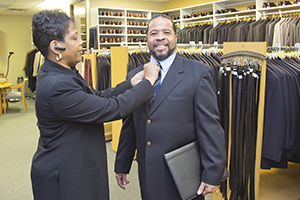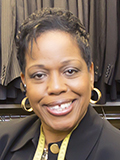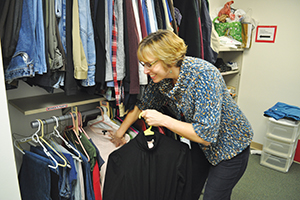By BETSY TAYLOR
When 52-year-old Carl Lewis of Indianapolis attended a job fair, he got two opportunities: He made a connection that led to a future job interview with a catering company, and he met Linda Nunley. She manages two Ascension St. Vincent Health ministries: a job readiness training program and Danny's Closet of Hope, which provides professional clothing for men in need of a business suit.
Lewis, who runs a vehicle detailing business, had been looking for additional work for more than a year. "My confidence level was down," he said. Nunley scheduled him for a suit fitting at Danny's Closet the following week, just hours before his job interview.

Linda Nunley, founder of Danny's Closet of Hope, straightens Carl Lewis' tie. Lewis, 52, of Indianapolis, had a successful job interview in the suit from Danny's Closet.
"It was like Clark Kent to Superman," Lewis said of the mental boost he felt once dressed in a gently used navy single-breasted suit, dress shirt, print tie, shoes and coat he got at no cost. Danny's Closet of Hope provided all the accessories he needed too, from new socks to a leather business portfolio. Lewis headed to the interview and was hired by the catering business on the spot. "I was feeling more confident in myself because of the way I was dressed," he said.
Several Catholic hospitals and health care ministries, including St. Vincent Indianapolis hospital, keep a stash of clothes on hand for patients in need of something to wear during their stay or upon discharge. Danny's Closet, which Nunley started in 2005, has a different purpose. It provides professional clothing, usually to low-income men and youth, but no one in need of a suit is turned away. Some are graduating or have a special event to dress up for; many are looking for jobs. Having the confidence to pursue and land meaningful employment builds self-esteem and well-being — emotional states related to overall health, she said. (Another Indianapolis nonprofit provides professional clothing for female job seekers.)
Danny's Closet is named for Nunley's son Danny, who was murdered in 2002. She started the effort modestly with some of her husband's donated business attire folded in a file cabinet drawer. Today, Danny's Closet occupies about 1,200 square feet of rented office space in a building about 2 miles from St. Vincent Indianapolis hospital. The stock includes several hundred suits, dress shirts and ties, as well as belts, top coats, new underwear and socks and more. Nunley said more than 4,880 men have been dressed through the program since it began. Each makes an appointment, and she fits them to a suit with the inventory on hand.
She learned how to measure men for suits from an experienced tailor. Fabric Care Center, a local business, donates more than $60,000 worth of free dry cleaning each year. Last summer, Payless ShoeSource sent $2,000 worth of gift cards to buy new shoes for the closet.
Nunley said she wants the Danny's Closet experience to be akin to shopping at a top men's department store. It's important to her that the suits are high quality and only gently used. "I want the men to know God gives good gifts," she said.

Nunley
William Geter, 32, of Indianapolis recently got fitted for a suit, after a college professor recommended a visit to Danny's Closet before Geter took part in a mock trial for a business class. Geter, who said he served three years in prison for selling drugs, has worked hard to move on from "some bad decisions" and now works as a cook while he goes to school.
He said that when he wears his navy blue, pin-striped suit, dress shirt and tie, he doesn't "get judged right off the bat;" people respond to him positively. The day Geter was fitted for his suit, he ran into one of his former instructors who was volunteering at Danny's Closet. The reunion prompted them to make plans to attend a church service together. "God was there," he said of his visit to Danny's Closet.
Danny's Closet has been so successful that Ascension is discussing expanding the program to other facilities, said Nick Ragone, Ascension's chief marketing and communications officer.
St. Mary's Hospital closet project
More typical of the clothing closets at hospitals is the one Debra Noell started at SSM Health's St. Mary's Hospital in Madison, Wis., last fall for patients in need of clothing. The social worker said the hospital has long had a file cabinet, with a few donated clothing items to give to patients. Earlier in 2015, Noell brought a few of the items from the cabinet to a petite patient, who was dwarfed by a donated winter coat. Noell and the woman lined a pair of too-large donated boots with paper towels before the patient was discharged to a nine-month substance abuse treatment program. "It just really bothered me," Noell said, "It haunted me, really. We need to have resources for people in need."

Social worker Debra Noell organizes donated clothes available to St. Mary's Hospital patients in need of an item or outfit. The SSM Health hospital is in Madison, Wis.
She asked colleagues at the hospital to help her stock a closet where social workers can find clean clothes in a range of sizes to give to patients, some of whom may arrive at the hospital in a nightgown or pajamas, or not have family and friends to turn to for even a change of clothes during their stay. "Everybody who heard about what we were doing wanted to be a part of it," Noell said.
The hospital's maintenance staff built a roughly 90-square-foot storage closet in the hospital's care management department, repurposing some surplus shelves. Hospital employees and community members donated clothes, and the care management team initially laundered 12 bags of clothing to fill the closet. Men's and women's items are organized by clothing type and size. Drawers hold new underwear, socks and winter hats. Comfortable shoes line three shelves. Noell said providing patients with comfortable, properly fitting clothes respects their dignity. "I feel like we've been able to step in with a little thing and make a huge difference," she said.
Copyright © 2016 by the Catholic Health Association
of the United States
For reprint permission, contact Betty Crosby or call (314) 253-3477.